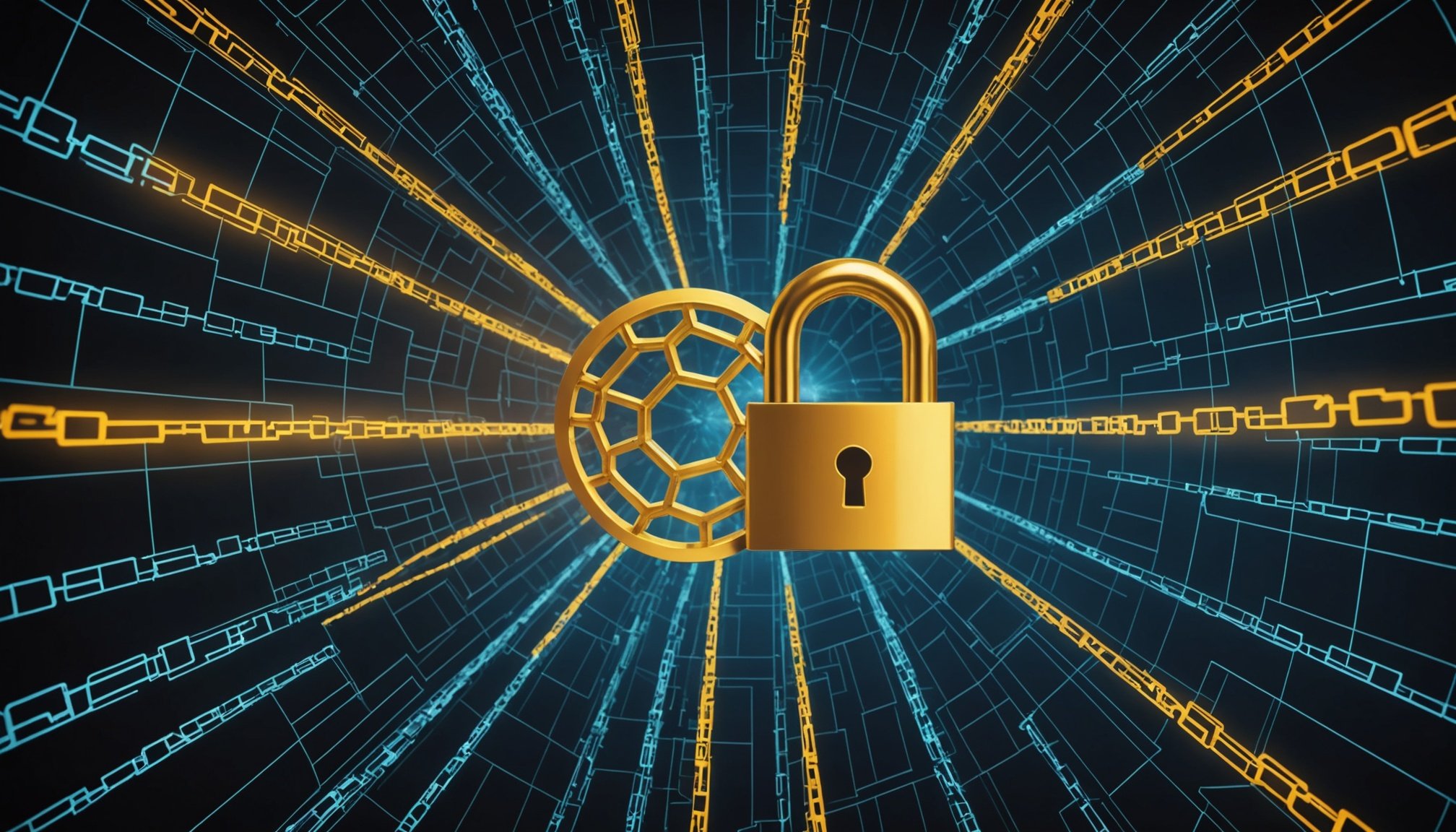Transforming Private Data Sharing: Leveraging Blockchain for Unparalleled Security Solutions
In the era of digital transformation, the security and privacy of data have become paramount concerns for individuals, businesses, and governments alike. Traditional data sharing methods often fall short in providing the necessary security and transparency, leaving sensitive information vulnerable to breaches and unauthorized access. This is where blockchain technology steps in, offering a revolutionary approach to secure data sharing.
Understanding Blockchain Technology
Before diving into the specifics of how blockchain enhances data security, it’s essential to understand the fundamental principles of blockchain technology.
Also read : Mastering AI Compliance: Your Comprehensive Guide to Navigating Global Cybersecurity Standards
Decentralization and Transparency
Blockchain is a decentralized, distributed ledger technology that records transactions across many computers. This decentralization removes the need for a central authority, making it harder for hackers to exploit a single point of failure. Each transaction on the blockchain is transparent, yet the identities of the parties involved can remain anonymous, ensuring both security and privacy[5].
Immutability and Consensus Mechanisms
Once a transaction is recorded on the blockchain, it cannot be altered. This immutability is ensured through advanced cryptographic techniques and consensus mechanisms, such as proof-of-work or proof-of-stake, which validate transactions and maintain the integrity of the blockchain[5].
In parallel : Transforming Healthcare with Cutting-Edge AI: A Pioneering Platform for Early Disease Detection
Smart Contracts and Cryptography
Smart contracts, self-executing contracts with the terms directly written into code, automate various processes on the blockchain, including data sharing and access control. Cryptography secures data and ensures privacy by using public and private keys, making unauthorized access virtually impossible[5].
Enhancing Data Security with Blockchain
Blockchain technology offers several innovative solutions to enhance data security, making it an ideal choice for secure data sharing.
Secure Data Transmission
Blockchain enables tamper-proof data transmission with end-to-end encryption. By distributing data across multiple nodes, blockchain reduces the risk of a single point of failure, making it much harder for hackers to compromise the system. This is particularly useful in industries such as healthcare, where sensitive data needs to be shared between multiple parties while maintaining confidentiality[4].
Decentralized Storage of Critical Data
Traditional centralized storage systems are prime targets for cyberattacks. Blockchain’s distributed storage ensures redundancy and reduces the risk of data breaches. For instance, Veritis utilizes blockchain to create decentralized storage solutions, where data is stored across multiple nodes, providing enhanced protection for critical business data[1].
Access Control and Identity Management
Blockchain can decentralize identity management and enhance user authentication. By leveraging smart contracts and multi-attribute-based access control strategies, blockchain ensures that only authorized users can access sensitive data. For example, a secure data sharing model proposed in a recent study uses attribute-based signcryption and smart contracts to manage and share encrypted transaction information, ensuring that data privacy and integrity are maintained[2].
Real-World Applications of Blockchain for Secure Data Sharing
Blockchain technology is not just a theoretical concept; it has numerous real-world applications that are transforming the way we share and manage data.
Healthcare
In the healthcare sector, blockchain is used to secure patient records and facilitate secure data sharing between healthcare providers. For instance, blockchain can ensure that medical records are tamper-proof and accessible only to authorized personnel, enhancing patient privacy and data integrity[5].
Financial Services
Blockchain is revolutionizing financial services by securing transactions and reducing fraud. Smart contracts automate various financial processes, ensuring that transactions are transparent, secure, and immutable. This not only speeds up transactions but also lowers costs associated with traditional banking systems[5].
Supply Chain Management
Blockchain provides a transparent and immutable record of every transaction in the supply chain, ensuring that data integrity is maintained and products are not tampered with during transit. This transparency reduces fraud and improves trust among stakeholders in the supply chain[5].
Use Cases for Blockchain in Cybersecurity
Blockchain is not limited to just secure data sharing; it has a wide range of use cases in cybersecurity.
Mitigating DDoS Attacks
Blockchain can decentralize DNS infrastructure, making it more resilient to Distributed Denial-of-Service (DDoS) attacks. By distributing traffic across numerous nodes, blockchain reduces the risk of a single point of failure and enhances system availability[1].
Securing IoT Environments
The Internet of Things (IoT) is particularly vulnerable to cyberattacks due to the lack of robust security measures in many IoT devices. Blockchain can secure IoT environments by creating a decentralized network where each device is authenticated and monitored, reducing the risk of it being compromised[4].
Compliance With Regulations
Blockchain helps organizations comply with regulatory requirements by creating transparent and immutable records. For example, Veritis leverages blockchain to streamline audits, maintain data integrity, and simplify adherence to regulatory requirements by offering auditable data trails[1].
Practical Insights and Actionable Advice
If you’re considering implementing blockchain solutions for secure data sharing, here are some practical insights and actionable advice:
Start Small
Begin with a pilot project to understand the feasibility and benefits of blockchain technology in your specific use case. This will help you identify potential challenges and develop strategies to overcome them.
Collaborate with Experts
Work with blockchain experts and developers who have experience in implementing blockchain solutions. This will ensure that your implementation is secure, efficient, and aligned with your business needs.
Focus on Transparency and Trust
Blockchain’s transparency is one of its strongest features. Ensure that all stakeholders understand the benefits of transparency and how it enhances trust in the system.
Table: Real-World Applications of Blockchain for Security and Privacy
| Application | Description | Benefits |
|---|---|---|
| Supply Chain Management | Track products from origin to consumer | Increased transparency and reduced fraud |
| Healthcare | Secure patient records and data sharing | Improved privacy and data integrity |
| Financial Services | Secure transactions and reduce fraud | Faster transactions and lower costs |
| Voting Systems | Secure and transparent voting processes | Increased trust in election outcomes |
| Digital Identity | Manage identities securely and privately | Empower users with control over their data |
| Intellectual Property | Protect and manage IP rights | Reduced infringement and better tracking |
| Insurance | Automate claims processing with smart contracts | Faster claims and reduced fraud |
| Real Estate | Secure property transactions and ownership records | Reduced fraud and faster transactions |
| Energy Trading | Facilitate peer-to-peer energy trading | Increased efficiency and reduced costs |
| Charity Donations | Track donations and ensure they reach intended recipients | Increased transparency and trust |
Detailed Bullet Point List: Key Benefits of Blockchain in Data Security
- Decentralization: Removes the need for a central authority, reducing the risk of a single point of failure.
- Immutability: Ensures that once recorded, transactions cannot be altered, maintaining data integrity.
- Transparency: Allows for easier auditing and tracking of data changes, enhancing trust and security.
- Advanced Cryptography: Protects data with public and private keys, ensuring secure and tamper-proof transactions.
- Smart Contracts: Automates various processes, including data sharing and access control, ensuring efficiency and security.
- Access Control: Ensures that only authorized users can access sensitive data, reducing the risk of unauthorized access.
- Real-Time Monitoring: Enables real-time detection and response to cyber threats, reducing the risk of successful cyberattacks.
- Compliance: Simplifies adherence to regulatory requirements by providing transparent and immutable records.
- Identity Verification: Enhances identity management by creating immutable and verifiable digital identities, preventing identity theft and fraud.
Quotes from Experts
- “Blockchain technology is well-known for its decentralized, transparent, and tamper-evident characteristics, making it an ideal solution for protecting data in an increasingly digital world.”[3]
- “By leveraging blockchain technology, we can create tamper-resistant networks that prevent unauthorized data manipulation, enhancing threat response capabilities and providing more robust defenses.”[1]
- “Blockchain ensures that data transactions between parties are secure and cannot be intercepted by unauthorized individuals, which is particularly useful in industries such as healthcare.”[4]
Blockchain technology is transforming the way we approach data security and privacy. With its decentralized, transparent, and immutable nature, blockchain offers unparalleled security solutions for secure data sharing. Whether it’s securing patient records in healthcare, automating financial transactions, or protecting IoT devices, blockchain is the future of cybersecurity. As we continue to navigate the complexities of the digital world, embracing blockchain technology can provide the trust, security, and transparency that are essential for safeguarding our digital assets.





